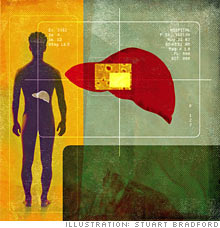A tiny cure for cancer?
A startup's nanotechnology promises to zap liver tumors without nasty side effects.

(Fortune Small Business) -- Both aggressive and hard to treat, liver cancer kills more than 650,000 a year worldwide. The American Cancer Society pegs the overall survival rate at less than 10%. Enter Aura Biosciences, a student startup that has developed an ingenious new means of delivering cancer-killing drugs to liver (and other) tumors.
Aura's founders - Elisabet de los Pinos, 35, her brother Jordi, 33, an electrical engineer, and biochemist Zeid Barakat, 29 - are selling a tiny, hollow protein particle developed by scientists at a European cancer research center. That particle, which Aura markets under the name Nanosmart, is an organic envelope that carries chemotherapy drugs directly to cancer cells, making treatment safer and more effective, the founders claim.
Traditional chemotherapy releases drugs directly into the body, killing both cancerous and healthy cells and causing side effects that can include nausea, hair loss, mouth ulcers, and even death. By contrast, Nanosmart encapsulates the drug until it reaches tumor cells inside the liver, where it is released. The protein can also carry a fluorescent marker detectable by magnetic resonance imaging (MRI), which allows doctors to measure a tumor's size, see whether it has spread, and judge the efficacy of treatment.
Aura was launched last November in Cambridge, Mass., where Barakat and Jordi de los Pinos were attending the Sloan School of Management at MIT. They plan to market Nanosmart to Eli Lilly (LLY, Fortune 500), Sanofi-Aventis (SNY), and other makers of widely prescribed chemotherapy drugs. Many of those drugs will be coming off patent in the next three to five years. When that happens, the drugs could be combined with the Nanosmart particle, says Aura CEO Elisabet de los Pinos, a former marketing manager at Eli Lilly. That could result in new formulations patentable for another 20 years.
To speed up the long approval process for new drugs, Aura is applying for an orphan-drug designation from the FDA and its European counterpart, the EMEA. Orphan-drug status carries significant benefits. In the U.S. it allows a company to use fewer patients in clinical trials, opens access to tax credits and grant funding, and guarantees market exclusivity for seven years.
The designation is usually given to drugs that treat rare diseases but can also be granted if a life-threatening illness has no satisfactory treatment. Liver cancer fits the second category, though not the first.
Aura took ninth place at the 2008 Rice University Business Plan Competition, co-sponsored by FSB. Although the judges praised Aura's business plan, they also pointed out some significant hurdles in its path. Even if Aura manages to obtain orphan-drug status, it must still prove that Nanosmart beats other drug-delivery systems on the market.
"That's an extremely tough row to hoe, especially in oncology," says contest judge Jerry Cobbs, a venture capitalist and managing director at Signet Healthcare Partners in Houston. "There just isn't enough data yet to know if this will work."
Although Nanosmart is new, the idea of using proteins to encapsulate drugs is not. Many drugs today are formulated in protein envelopes called liposomes. Nanosmart is a variation on that theme, says oncologist Louis Weiner, director of the Lombardi Comprehensive Cancer Center at Georgetown University. Nanosmart could be more targeted and more efficient than other nanodelivery systems, Weiner says, but it could also break apart in the body or attach to a healthy cell by mistake.
"You might end up with surprising side effects," says Weiner, whose research focuses on tumor targeting.
The founders acknowledge that there's no way to know whether Nanosmart will work in humans until after clinical trials. But like many early-stage biotech startups, Aura faces a catch-22: The trial research won't be cheap, yet it's tough to attract investors without clinical data. The company has about $300,000 in hand and expects to raise another $3.1 million in grants and seed financing by January.
If clinical trials prove Nanosmart's safety and efficacy, the company hopes to market the particle for use in treating breast and bladder cancer as well.
"The potential is huge," says nanotechnology analyst Marlene Bourne, president of Bourne Research in Scottsdale. "I think these guys are really onto something."
Editor's Note: An earlier version of this story incorrectly stated that incorrectly stated that liver cancer kills more than 650,000 a year in the U.S. alone. The National Cancer Institute estimates that liver cancer will cause 18,410 deaths in the U.S. In 2008; the 650,000 figure is a worldwide one. Fortune Small Business regrets the error. ![]()
Where are they now?: See what student-startup business plan winners have been up to since the competition.
Sprinting toward less stinky sportswear
Student grudge match
Growing a new organ
-
The Cheesecake Factory created smaller portions to survive the downturn. Play
-
A breeder of award-winning marijuana seeds is following the money and heading to the U.S. More
-
Most small businesses die within five years, but Amish businesses have a survival rate north of 90%. More
-
The 10 most popular franchise brands over the past decade -- and their failure rates. More
-
These firms are the last left in America making iconic products now in their twilight. More













